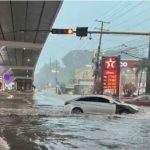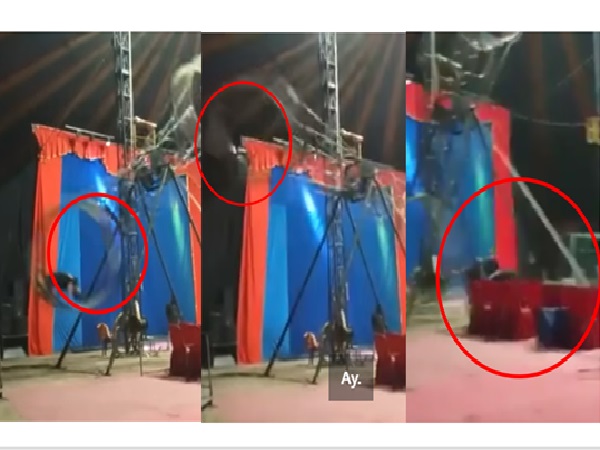
This Sunday the Christian Democracy (DC) is experiencing the most tense and complex internal elections of recent times, with a low electoral performance and with still open wounds with its historical partners on the center-left. There are 3 lists that will compete: one led by Mayor Felipe DelpIn, another by Diego Calderón and one by Joanna Pérez. In this last list, the mayor of San Ramón, Gustavo Toro, is the second vice president.
This took charge of a commune that was at the center of the controversy over cases of corruption in the administration of Miguel Ángel Aguilera, in an election that had to be repeated. Today, about 5 months after taking office, in an interview with The counter, addressed the measures against drug trafficking, the management of COVID-19 and the internal one of the DC, in addition to the projection of his community in front of the installation of the new government on March 11, commanded by the President-elect Gabriel Boric.
-There has been a significant increase in COVID-19 infections, how is the municipality of San Ramón dealing with it? Do you lack government support?
-We are quite concerned because we feel that infections have increased considerably and the resources remain the same. In the case of communes like San Ramón, unfortunately we do not have large incomes in terms of public health, nor do we have in our coffers to be able to invest and today we are trying to improve care.
We opened two emergencies, making a lot of efforts, and also reinforcing vaccination. We believe that it is important that we be accompanied in this process, that we can be guaranteed that we will have resources to be able to arrive optimally and on time for the neighbors.
-How do you evaluate the management that the Government has had, for example, regarding changes in close contacts? And just when cases increase.
-We believe that there is a lack of more information, more contact with citizens. In terms of resources, I think they have to strengthen primary health care. In the case of the Cesfam, we are the first line in terms of care for cases of contagion, and today we do not have enough resources to be able to provide support.
We must remember that when families are infected, they are sent to quarantine at home, and that means they cannot leave, and as a municipality we do not have the resources to be able to collaborate at that time. Deliver merchandise, gas vouchers, or whatever is required, because they are also humble families.
-Days ago, President Sebastián Piñera enacted the law that allows the closure of passages. Some mayors, although they valued everything that contributes to the security of the people, classified it as a failure in the Government’s public security policy. How do you see it?
-First, we must verify that the theme of the passages is a reality. Every day people are closing more passages for fear of robberies, clandestine races, crazy bullets and drug trafficking, which is taking more possession in the territories and communes. What the law does is regulate a situation that is occurring, but it does not accompany them in the background, which is how to solve the defenselessness that neighbors have today, in the face of the crime wave that is occurring.
I think it is a tailor-made suit to get out of trouble, given the Comptroller’s measure to remove several gates, but I feel that it does not solve any underlying problem, and the situation remains the same as before.
-You were talking about the issue of drug trafficking, which crosses several levels in society, how much can the municipality and the Government do?
-We can do a lot when we feel the support of the private world and the Government, when we take preventive programs seriously, when we occupy spaces that today are taken over by gangs, when we are capable of worrying about children, when we create opportunities.
The big problem that drug trafficking has in Chile is that there is a welfare drug trafficker, who is collaborating with people abandoned by the State, whom nobody cares about, and that is where they beat us. The State has to arrive on time, especially to people who have been marginalized. There, without a doubt, we will win this battle.
-What are you and your administration doing on this issue? Also in the more political dimension, because his predecessor is related to the drug world.
-We are fighting corruption within the municipality, and that has meant firing a significant number of people who actively participated in corruption, and another group who are not linked to corruption but who were not providing services to the community.
We are improving the services of our municipality, we are cleaning our commune, we are putting more lights, green areas and empowering the neighbors so that they can have participation and make decisions when projecting the commune that we want to do. If the municipality is disconnected from the neighbors, from the neighbourhoods, that is where we can have a serious problem. We are arriving on time today with the needs. We certainly lack many resources, but there is a much more permanent dialogue and the neighbors value it.
-A few days ago, the mayors presented an initiative for a constitutional regulation of Territorial Justice, what are the most important aspects?
-The mayors consider that there is territorial injustice, which has to do with the fact that it is difficult to be a local government. There is inequality in terms of the income we receive. Communes such as San Ramón have a per capita of $180,000 per year, compared to Vitacura, Las Condes, which has $1,400,000 per capita per year. In addition, we have much more demand and requirements from citizens.
The most specific case has to do with public health. 90% of our population is served by Fonasa, and therefore goes to primary care services. Not so in the communes of the eastern sector, where primary care is less required and there is less expense.
The initiative aims essentially at equality in the income of the municipalities, investment being equitable, and furthermore, investment from the Government arrives promptly and not late, when we already have to pay with people’s lives or when neighborhoods They are taken over by crime.
We want justice to reach all sectors equally. We do not want rich municipalities and poor municipalities, nor do we want so much social inequality to exist in neighborhoods, because if one travels through the southern sector and then goes to the eastern sector, one notices a huge gap in inequality and that is quite painful for the country that we want to build.
Internal elections of the DC and the government of Gabriel Boric
-This Sunday are the internal elections of the DC, perhaps the most difficult in recent times and the most tense. You compete in one of the lists, do you see an environment with foul play?
-I am very optimistic because there are people who are putting their names with the will to write this new Christian Democracy, of the three lists. We think there are very good people on all three lists.
We know that this Christian Democracy is not the same as it was 20 years ago, which had 25% support, today we have reached 4%. We have a lot of representation, both in Congress and in the municipalities. We are very low but we have not fallen to the bottom, because there are still people of good will who are working for this match. We have authorities that represent us and that are valued throughout Chile. The DC is a historic party that we find throughout the country. We have traveled from Arica to Punta Arenas and everywhere we find a Christian Democrat.
The scenario is not easy, especially when the Government and the authorities are more linked to the hardest left, but we believe that in the construction of this new Chile there are no political colors, there is only the dream that people have to live better , and from there we build. And I believe that the DC today has to position itself, restructure itself, and be a participatory agent in the new construction of Chile by 2040, 2050.
-But do you think there has been foul play?
-I think there is a little bit of anxiety in the climate and I think that at times it falls into disqualifications. I do not like that. It is sometimes part of political competition, but I think we are not in a time of disqualification, especially when there is an environment that has to be favorable, because people find it hard to believe in the parties, and we have to be united, Regardless of who wins. Disqualifications and passes to carry cannot be present. I have seen that and it is sad when you want to show that you have a party that is participatory and that calls people together. If people see us as enemies, divided, we as DC are doomed to disappear.
-What role should the DC play in this new political time, when a new government and a new Congress are installed?
-The DC has a main role in the construction of this new Chile. It has to be renewed, it cannot still be thinking about the Government of Frei Montalva. Without a doubt it was very significant, but we have to move forward. The problems are different and we also have to offer a country project.
We represent a sector that is the political center, and the political center is in dialogue with all the political structures that exist, and we are also capable of balancing the political message that exists in this slightly polarized Chile. I believe that from next year the polarization will begin to decompress.
We are an alternative for a world, no less, of Christian humanism that lives and fights in this country, in the lower classes and the middle class.
-You defined being outside the Government, but what gestures do you expect from the new Government towards the DC?
-It is important that we are heard. We are people who have something to say and point out how we want to build this new Chile. We represent an important number, we have authorities. We want to be heard and, if we are invited, we will also be available to collaborate in this new construction.
-What is the difference of the list that you integrate in front of the others?
-We have a lot of representation throughout Chile. It is the only list led by a woman, who is also a parliamentarian. The big fights are going to take place in Congress, where the environment is going to be very polarized, from there the laws that are going to govern us are going to be determined, but also the list represents the youth that we want to impregnate. Most of our candidates are around 40 years old and, furthermore, we have a political background and representation in every job we do. There are two deputies, a governor, mayors. We have a bit of experience with the people and we are in tune with what Chile needs.

















